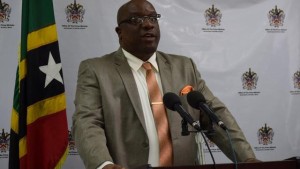 Prime Minister Dr. the Honourable Timothy Harris and Cabinet Secretary, Mrs. Josephine Huggins met with more than 100 civil service professionals on Thursday and Friday.
Prime Minister Dr. the Honourable Timothy Harris and Cabinet Secretary, Mrs. Josephine Huggins met with more than 100 civil service professionals on Thursday and Friday.
The series of meetings formed part of the Government’s ongoing efforts to communicate clear expectations to its staff, improve employee engagement and workplace relationships, and ensure sustainable performance in the public sector.
On the matter of ensuring sustainable performance, Prime Minister Harris inspired a lot of discussion last December when he announced in his 2016 Budget Address that the Team Unity Administration intended to improve efficiency in the public sector by implementing the increasingly popular pay for performance practice.
“The intent is to motivate individuals to perform at their optimal levels with the expectation that commensurate rewards will result from their work effort. At the outset, a pilot programme will be considered that carves out a modest allocation of funds from existing programmes to finance an incentive-based programme that rewards outstanding work effort,” Dr. Harris said in his Budget Address to the nation.
During the government staff meetings this week, pay-for-performance was at the fore of discussions, with Prime Minister Harris saying, “We may expect – had it not been for the lesson of the IMF intervention – that every year we will get an increase, whether or not we perform. However, we have to move towards performance-based pay. That is where I intend, as the Minister with responsibility for the human resources of the government, to take the country over time.”
Context on “the lesson of the IMF intervention”: The International Monetary Fund’s St. Kitts and Nevis Country Report published in September 2011 stated that the authorities started to implement a strong fiscal adjustment program at the end of 2010, after having been “faced with increasing fiscal imbalances.” The IMF report said elements of the program included civil service reform. “St. Kitts and Nevis’ public sector is large even by standards of small states,” the report said, adding that, “In order to underpin improvements in the fiscal position during the program period, the authorities will freeze the wage bill for the next three years.”
Between 2011 and 2014, the Douglas-led regime imposed on civil servants a wage freeze and took away their increments. In January 2014, the former government discontinued the wage freeze and restored incremental payments.
Speaking with the civil service professionals this week, Prime Minister Harris expounded on his Administration’s view that compensation should match an individual’s impact on and contribution to the organization.
“If you perform exceptionally well, you will be rewarded exceptionally well. If you are performing consistently well, your Permanent Secretary must fast track you through the scales. If you are not performing, you must not get any increment. If you are not performing and you are unwilling to change, then we’d have to find alternative things for you to do. You have to get your friends who are not industrious and creative on that page,” the Prime Minister said.
Prime Minister Harris said his Administration would establish tangible performance metrics, i.e. what ought to be rewarded and incentivized. The Prime Minister also said the performance metrics would consider several factors rather than just a civil service employee’s length of tenure.
“We want the system to be able to recognize and reward people who are doing superb work and to hold them up as persons whom others should emulate. I think that is the new culture we want to create, and over time we are going to get there,” the Prime Minister said.
Dr. Harris added, “Years of service certainly would not be the only criteria. We have to look at a composite measure because you could be here long and be behaving badly.” That point made by the Prime Minister elicited robust laughter from government staffers, but all jokes aside Prime Minister Harris and his team are taking the move towards performance-based pay seriously.
The Prime Minister said this week that the Government shall contract experts to work with its human resources department in setting up and structuring a performance-based programme. Prime Minister Harris added that His Excellency Dr. Everson Hull, Ambassador and Permanent Representative to the Organization of American States (OAS) for St. Kitts and Nevis, is working with the Government on this matter.
It is increasingly clear that serious organizations throughout the world see pay for performance as the way to go. For instance, on March 31st, the Harvard Business Review published the results of the 2016 Compensation Best Practices Report based on research conducted by Payscale, Inc. The HBR article titled When Unequal Pay Is Actually Fair reports “the number of companies that offer bonuses or other forms of pay for performance has increased 6% over the last two years” and “highly successful companies – those who are leaders in their market and have surpassed revenue expectations – are the most likely to adopt this compensation policy.” The article also states, “It appears there is a growing trend toward using bonuses to pay for performance, as half of these top performing companies are increasing their budget for bonuses in 2016.”
